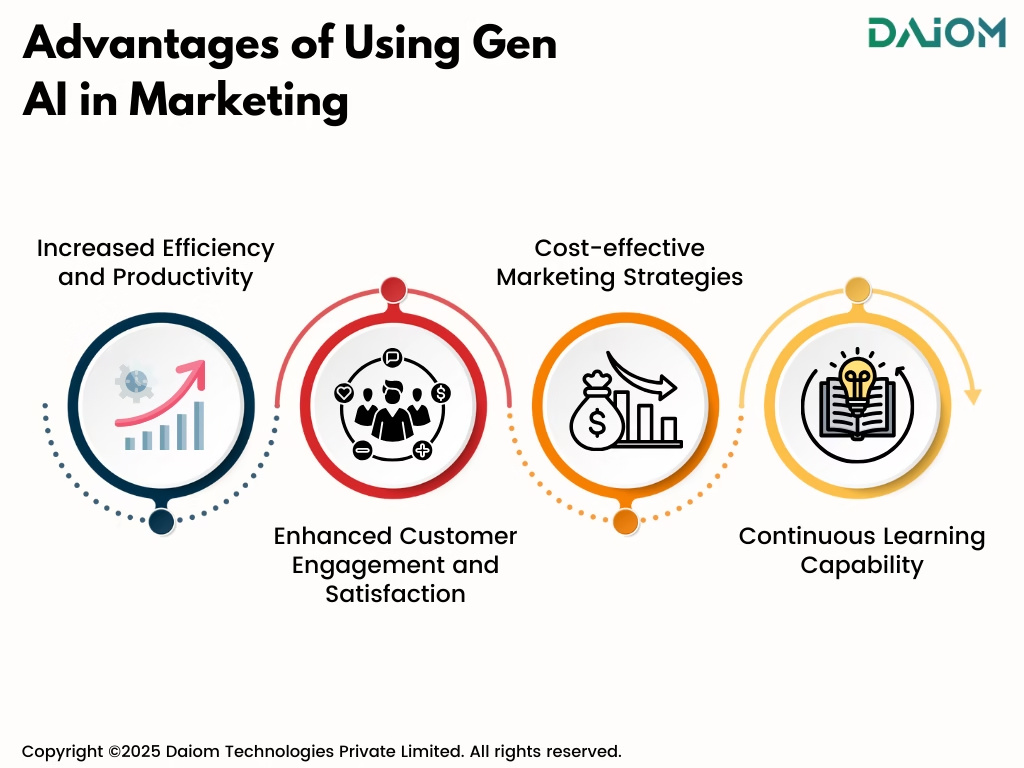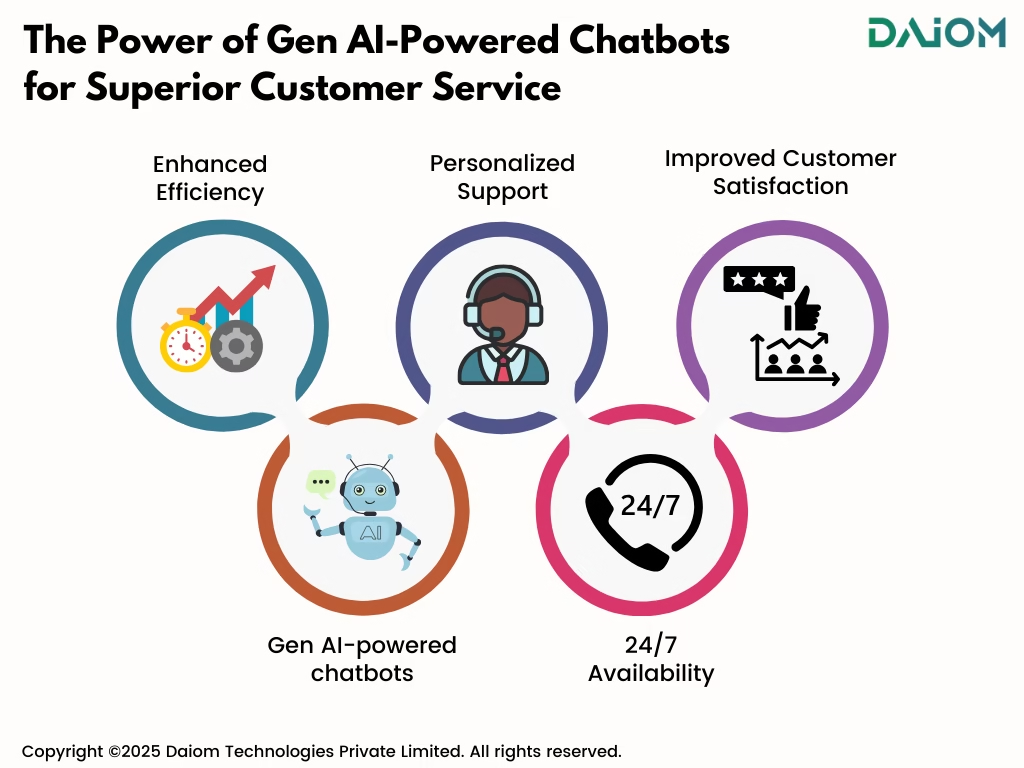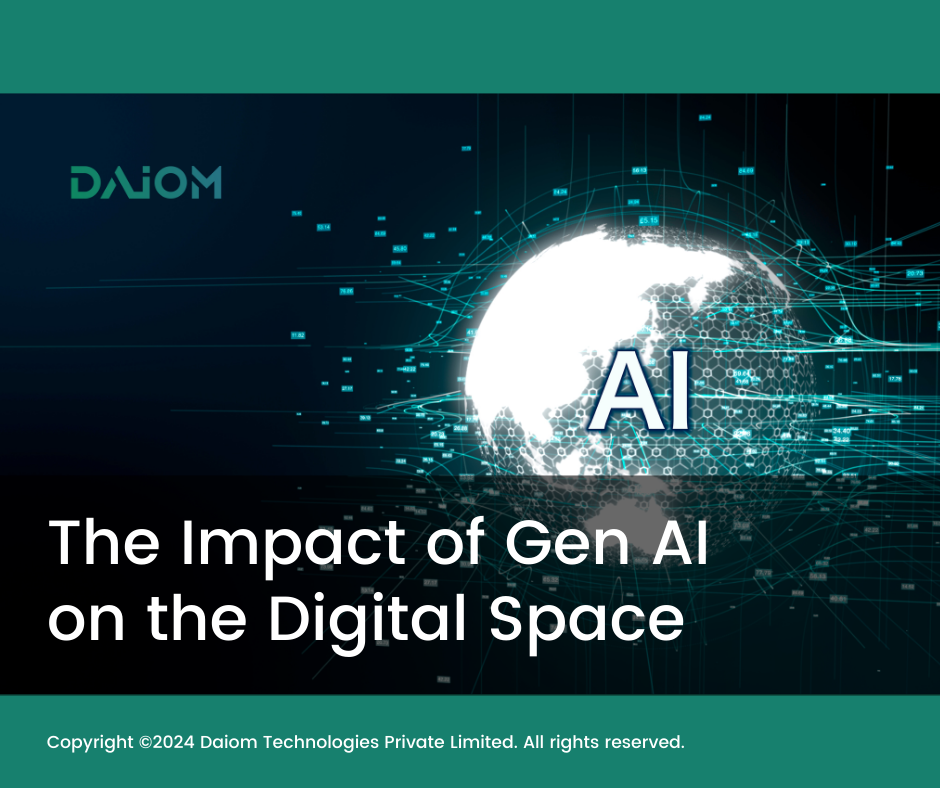Generative AI or Gen AI has transformed the landscape of marketing, pushing the boundaries of human imagination. This innovative technology, showcased by tools like ChatGPT and DALL-E, focuses on content creation rather than mere analysis, spanning text, designs, music, audio, and video.
At its core, generative AI employs deep learning models trained on extensive datasets, capable of performing diverse tasks in a remarkably human-like manner.
Generative AI exhibits a broader range of capabilities, allowing users to input text prompts and generate unique content reflective of the training data.
2. Important Stats
Here are a few interesting stats that show their adoption and implementation rates:
- 90% of AI-utilizing marketers find it effective for content creation. (Source: HubSpot)
- Content creators save over 5 hours weekly using AI. (Source: VentureBeat)
- 85% of marketing AI users leverage it for personalized content. (Source: Capgemini)
- Deloitte reports 82% of early AI adopters achieving financial returns.
- Forrester predicts that by the end of 2023, 10% of Fortune 500 companies will create content with AI.
Generative AI brings numerous benefits to the field of marketing, revolutionising advertising and promotional strategies.
3. Advantages of using Gen AI in Marketing

- Increased Efficiency and Productivity: Generative AI streamlines marketing processes by automating routine tasks, freeing up marketers to focus on strategic and creative aspects. This automation not only enhances the creation of tailored content but also eliminates human errors that can affect data quality. This leads to optimized marketing efforts, improved campaigns, and efficient audience targeting.
- Enhanced Customer Engagement and Satisfaction: Generative AI analyses data to gain insights into customer behavior and preferences, allowing marketers to tailor their strategies accordingly. This technology facilitates personalized recommendations, targeted advertising, and interactive experiences, fostering deeper connections with customers and ultimately enhancing satisfaction.
- Cost-effective Marketing Strategies: The integration of generative AI enables marketers to automate and optimize various campaign elements, reducing the reliance on manual labor and streamlining processes. This automation not only saves time but also cuts costs associated with traditional marketing methods.
- Continuous Learning Capability: Generative AI algorithms evolve and improve over time by learning from an expanding dataset. Constant exposure to user interactions and feedback allows these AI systems to enhance their understanding and adaptability. This continuous learning ensures that the AI can provide more accurate and personalized solutions as it evolves alongside customer needs.
As a survey by McKinsey suggests, 90% of marketing leaders anticipate a surge in the use of generative AI tools in the next two years.
Companies embracing AI in their strategies are poised to reap significant benefits, including enhanced innovation, data-driven decision-making, streamlined product development, personalized customer experiences, and improved time and cost efficiency.
4. Use Cases of Gen AI
Upon all the hyped-up use cases of Generative AI, the following are the most practical and impactful use cases that are reshaping industries and driving tangible results.
Content Generation
Generative AI has revolutionized content creation by addressing text, image, and video production. Automated tools powered by AI can now generate engaging and relevant content, reducing the manual effort required for creative tasks. This not only accelerates content creation but also enhances quality and consistency.
Most early adopters are just beginning to tap Gen AI’s potential as a content collaborator. While those companies report that Gen AI is involved in the development of 46% of content, 78% of marketers consider AI a ‘game-changer‘ for content creation.
Most state that they are focused on using technology to improve and adapt marketing content rather than generate complex or complete content.
Tools that can be explored for content generation are:
1. Image:
DALL-E 2: Creates hyper-realistic images from text descriptions.
MidJourney: Generates artistic images and visual concepts.
Synthesia: Creates realistic videos using AI avatars that lip-sync to text.
2. Video Generation:
Runway: A text-to-video model, Gen-2, that allows users to create videos with prompts (sometimes using your images).
Synthesia: Another text-to-video platform that lets you create high-quality AI video content quickly.
3. Music Generation:
Audiocraft: Developed by Meta AI, Audiocraft provides open-source code and models for various music generation tasks.
Veed: Veed primarily focuses on video editing but offers a unique “Music Maker” feature using AI to generate royalty-free background music for your videos.
SEO Optimization
In the digital age, organic content distribution on platforms like YouTube, Facebook, and Instagram is crucial for marketing success. Generative AI, powered by machine learning, helps marketers optimize content strategies by creating unique and engaging materials tailored to audience preferences. This technology streamlines content creation, including articles and product descriptions, saving time and resources.
Generative AI excels in keyword research, identifying relevant keywords for strategic content optimization.
AI can identify long-tail keywords and analyze search intent, increasing keyword targeting accuracy (Semrush, 2023).
Implementing generative AI for SEO involves a strategic approach. Identifying areas that can benefit from AI implementation through a thorough analysis is key to unlocking the full potential of this technology.
70% of SEO experts believe Google’s algorithms can now detect AI-generated content (Search Engine Journal, 2023)
- Keyword Research: AI-powered platforms analyze extensive data, including search trends, user behavior, and competitor strategies, to identify the most impactful keywords for optimization.
- Competitor Analysis: Generative AI aids in analyzing competitors’ strengths and weaknesses, providing insights to refine your SEO tactics and gain a competitive edge.
- Performance Tracking: AI tools can analyze vast amounts of data, providing comprehensive reports and actionable recommendations for data-driven decision-making and optimized SEO strategies.
Customer Service
Customer service has long been a cornerstone of building brand loyalty and driving business success. However, in today’s fast-paced digital age, traditional methods are often falling short.
Customers expect immediate, personalized, and omnichannel support, and businesses are struggling to keep up.
This is where conversational AI, powered by Gen AI, is emerging as a game-changer. By integrating Gen AI chatbots with a company’s knowledge base, businesses can provide real-time, accurate support with a natural, conversational flow.
This not only streamlines customer service operations but also elevates the quality and personalization of customer interactions.

- Gen AI-powered chatbots offer a multitude of benefits for customer service:
- 24/7 Availability: Chatbots are never on break, ensuring customers receive prompt support anytime, anywhere. This is particularly crucial for businesses operating in a global market.
- Enhanced Efficiency: Chatbots can handle routine inquiries and tasks, freeing up human agents to tackle complex issues and personalize interactions. This leads to faster resolution times and improved agent productivity.
- Personalized Support: Gen AI chatbots can leverage customer data and past interactions to tailor their responses and recommendations, providing a more personalized and relevant experience.
- Improved Customer Satisfaction: By offering immediate, accurate, and efficient support, chatbots can significantly improve customer satisfaction and loyalty.
Below are a few examples of the Gen AI in Customer Service tools offered by Google
- Agent Assist: This AI tool helps agents resolve customer issues faster and more efficiently by providing real-time suggestions and knowledge-base search results.
- Dialogflow CX: This conversational AI platform enables businesses to build and deploy sophisticated chatbots that can understand natural language and engage in meaningful conversations with customers.
- Vertex AI: This unified platform provides a comprehensive set of AI and machine learning tools that can be used to develop and train custom AI models for specific customer service needs.
By embracing conversational AI, businesses can build strong customer relationships, drive loyalty, and gain a competitive edge in the digital marketplace.
Hyper-Personalization
Understanding individual behaviours and preferences is a cornerstone of successful marketing, and Gen AI takes personalization to new heights.
Marketers can leverage AI algorithms to analyse vast amounts of data, allowing for highly tailored experiences and content.
Beyond personalised copy, Gen AI facilitates personalization in images and videos in near-real-time, creating a more immersive and engaging user experience. This level of personalization contributes to increased user satisfaction and brand loyalty.
There are five essential components for achieving hyper-personalization:
- Data collection: This involves collecting detailed data about your customers, such as demographics, transaction history, browsing behavior, social media activity, and purchase history.
- Data analysis: This involves using machine learning algorithms to analyze the collected data and identify patterns and trends.
- AI and machine learning: These technologies are used to power personalization efforts, such as making predictions about what products or content individual customers are most likely to be interested in.
- Real-time decision making: This involves using the insights from data analysis and AI to make decisions about how to personalize the customer experience in real-time.
- Customer journey mapping: This involves understanding the different stages customers go through when interacting with your brand, from the awareness stage to the purchase stage, and beyond. This helps to ensure that personalized experiences are provided at every touchpoint.
Overall, Gen AI is a powerful tool that can be used to create personalized experiences that lead to increased customer engagement, satisfaction, and conversion rates.
As the technology continues to develop, we can expect to see even more innovative ways to use Gen AI for hyper-personalization in marketing.
Analytics Refinement
Generative AI revolutionises the role of analytics teams by providing powerful tools to swiftly and efficiently transform brilliant ideas and hypotheses into actionable intelligence. This transformative impact is achieved through several key avenues:
- Deeper Insights through Advanced Analytics: Generative AI represents a shift in leveraging data for decision-making. By harnessing advanced analytics capabilities driven by AI algorithms, marketers can delve deeper into the vast sea of available data. This surpasses the limitations of traditional analytics, offering a more comprehensive understanding of consumer behavior, preferences, and market dynamics.
- Real-time Analysis of Large Datasets: A distinctive strength of Generative AI lies in its ability to analyze large datasets in real-time. Traditional analytics processes often struggle to keep pace with the volume and velocity of data in today’s digital landscape. In contrast, Generative AI excels, providing marketers with the flexibility to adjust strategies dynamically in response to real-time insights.
- Identifying Emerging Trends: In dynamic markets, the capability to identify emerging trends is a game-changer. Generative AI stands out in recognizing patterns and outliers within data, offering marketers valuable insights to stay ahead of the competition. Whether it’s shifts in consumer behaviour, emerging industry trends, or unexpected market dynamics, Generative AI provides marketers with proactive foresight.
- Agile Marketing Strategies: The real-time capabilities of Generative AI enhance the agility of marketing strategies. Unconstrained by static data analysis, marketers can dynamically adapt their campaigns. This agility is crucial for responding to sudden market changes, capitalizing on new opportunities, or promptly mitigating potential risks.
Conclusion
In conclusion, Gen AI is not just a buzzword; it’s a transformative force in the marketing landscape. As businesses continue to embrace Gen AI, staying ahead of the curve in the digital marketing arena requires a strategic integration of these technologies into marketing strategies. The future of marketing is undeniably intertwined with the capabilities of Generation AI.
This blog post is derived from the article appeared in CXO Tech Bot
If you’d like to discuss how we can help enhance and optimize your Omnichannel and growth marketing strategies, we’d be happy to set up a consultation call. Feel free to reach out to us at alibha@daiom.in
For more informative content and blog, follow and stay tuned to DAiOM.
Subscribe to our NEWSLETTER!


